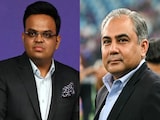- Dynastic politics across political spectrum poses a "grave threat" to Indian democracy, said Shashi Tharoor
- The Congress leader cited examples from Punjab, Telangana, Tamil Nadu, among others
- Dynastic politics are also practised across the Indian subcontinent, said Tharoor
The promise of democracy - government of the people, by the people, for the people - cannot be fully realised as long as Indian politics continue to remain a family enterprise, Congress MP Shashi Tharoor said.
The MP, who contested unsuccessfully for the Congress party chief's post, said it is about time that India traded dynasty for meritocracy, and called for fundamental reforms.
"It is high time India traded dynasty for meritocracy. This would require fundamental reforms, from imposing legally mandated term limits to requiring meaningful internal party elections, together with a concerted effort to educate and empower the electorate to choose leaders based on merit," Tharoor said.
This is the latest in a series of comments that have discomfited the Congress leadership and have upset many of Tharoor's colleagues, especially at a time the ruling BJP has repeatedly targeted the Gandhis.
The Thirvanathapuram MP, who served as a minister under the UPA government, said that dynastic politics across the political spectrum poses a "grave threat" to Indian democracy.
"When political power is determined by lineage rather than ability, commitment or grassroots engagement, the quality of governance suffers. Drawing from a smaller talent pool is never advantageous, but it is especially problematic when candidates' main qualification is their surname," he said.
The BJP took the opportunity to slam the Congress, suggesting the article is an expression of Tharoor's "disappointment with Rahul Gandhi".
"Shashi Tharoor's comment on the demerits of dynastic succession bereft of competence is an expression of his disappointment with Rahul Gandhi, whose leadership is having a deleterious effect on the fortunes of the Congress party and hastening its demise. Except for the BJP and, to some extent, the Communists, there is no semblance of internal democracy or merit triumphing over lineage in other parties. The regional parties, much like the Congress, share equal blame for failing to recognise leadership outside dynastic succession," said BJP's Amit Malviya.
Congress MP Udit Raj said "dynastic influence" is not limited to politics, adding it exists in every sector in the country.
"A dynastic approach exists in almost every sector in India, a doctor's son becomes a doctor, a businessman's child continues in business, and politics is no exception... From Nehru to Pawar, DMK to Mamata... there are many such examples... The loss is that opportunities remain confined to families alone. Dynastic influence is not limited to politics. It extends to the bureaucracy, judiciary, and even the film industry," said Congress MP Udit Raj.
In an article for international media organisation Project Syndicate, titled 'Indian Politics Are a Family Business', the Congress leader pointed out that while the Nehru-Gandhi family is associated with the Congress, dynastic succession prevails across the political spectrum.
In Odisha, after the passing of Biju Patnaik, his son, Naveen, won his father's seat in the Lok Sabha, Tharoor said.
The Maharashtra-based Shiv Sena's founder Bal Thackeray passed the baton to his son Uddhav, whose own son Aditya is waiting in the wings, he said.
"The same goes for Samajwadi Party founder Mulayam Singh Yadav, a former chief minister of Uttar Pradesh, whose son Akhilesh Yadav later served in the same post; Akhilesh is now an MP and the president of the party. In Bihar state, the leader of the Lok Janshakti Party, Ram Vilas Paswan, was succeeded by his son Chirag Paswan," Tharoor said, citing more examples of political dynasties.
He then cited examples from Punjab, Telangana and Tamil Nadu.
"In Punjab, the Shiromani Akali Dal, long commanded by Parkash Singh Badal, has been taken over by his son Sukhbir. Telangana is currently witnessing a battle for succession between the son and the daughter of the Bharat Rashtra Samithi's founder, K Chandrasekhara Rao. In Tamil Nadu, the late M Karunanidhi's family controls the ruling Dravida Munnetra Kazhagam party, with his son M K Stalin now serving as chief minister and his grandson anointed as heir apparent," he said in his article.
Away from the Indian "heartland", Jammu and Kashmir has been led by three generations of Abdullahs, with the principal opposition party dominated by two generations of Muftis, Tharoor said.
This phenomenon, Tharoor argued, is not limited to a handful of prominent families but is rather woven deeply into the fabric of Indian governance, from village councils to the highest echelons of parliament. He then cited examples from the Indian subcontinent.
"To be fair, such dynastic politics are practised across the Indian subcontinent," he said, citing examples of the Bhuttos and Sharifs in Pakistan, the Sheikh and Zia families in Bangladesh, and the Bandaranaikes and the Rajapaksas in Sri Lanka.
"But they appear particularly incongruous with India's vibrant democracy. Why then has India embraced the dynastic model so fully? One reason might be that a family can serve effectively as a brand: candidates with built-in name recognition do not have to work as hard to attract voters' attention or build their trust. If voters accepted a candidate's father, aunt or sibling, they would probably accept the candidate -- no credibility-building required," Tharoor said in the article published October 31.
Members of political dynasties are likely to be insulated from the challenges faced by ordinary people, they are often particularly ill-equipped to respond effectively to their constituents' needs, Tharoor argued in his article.















